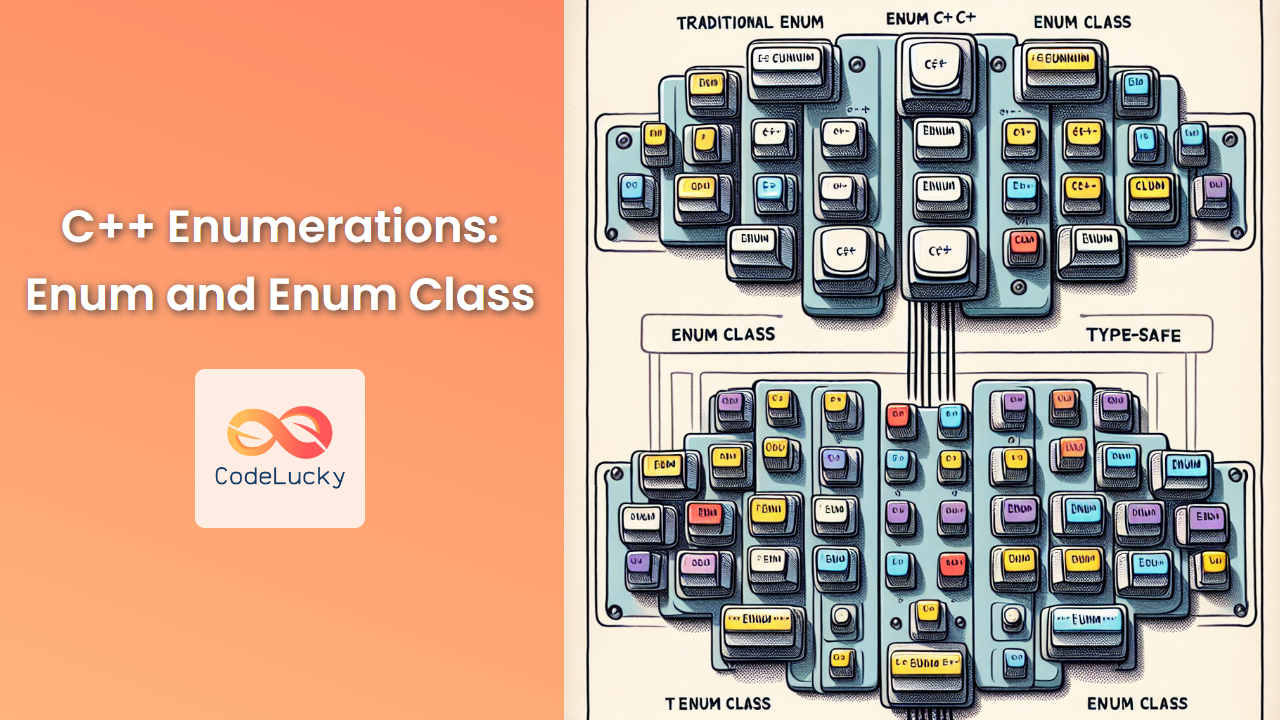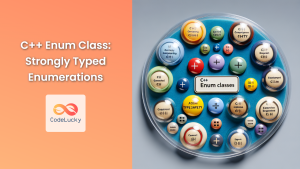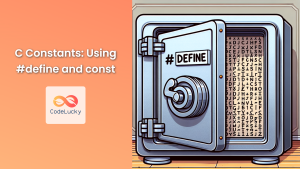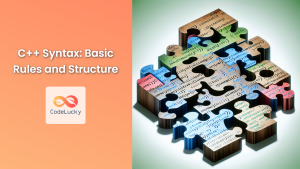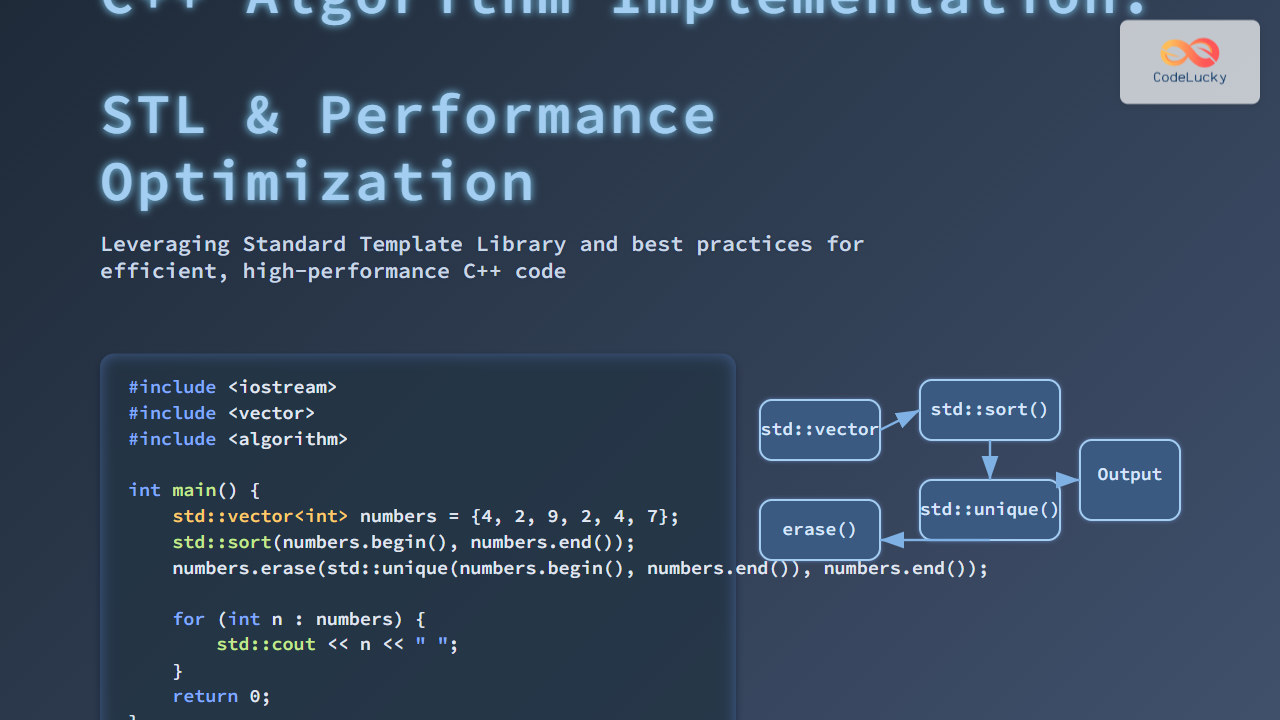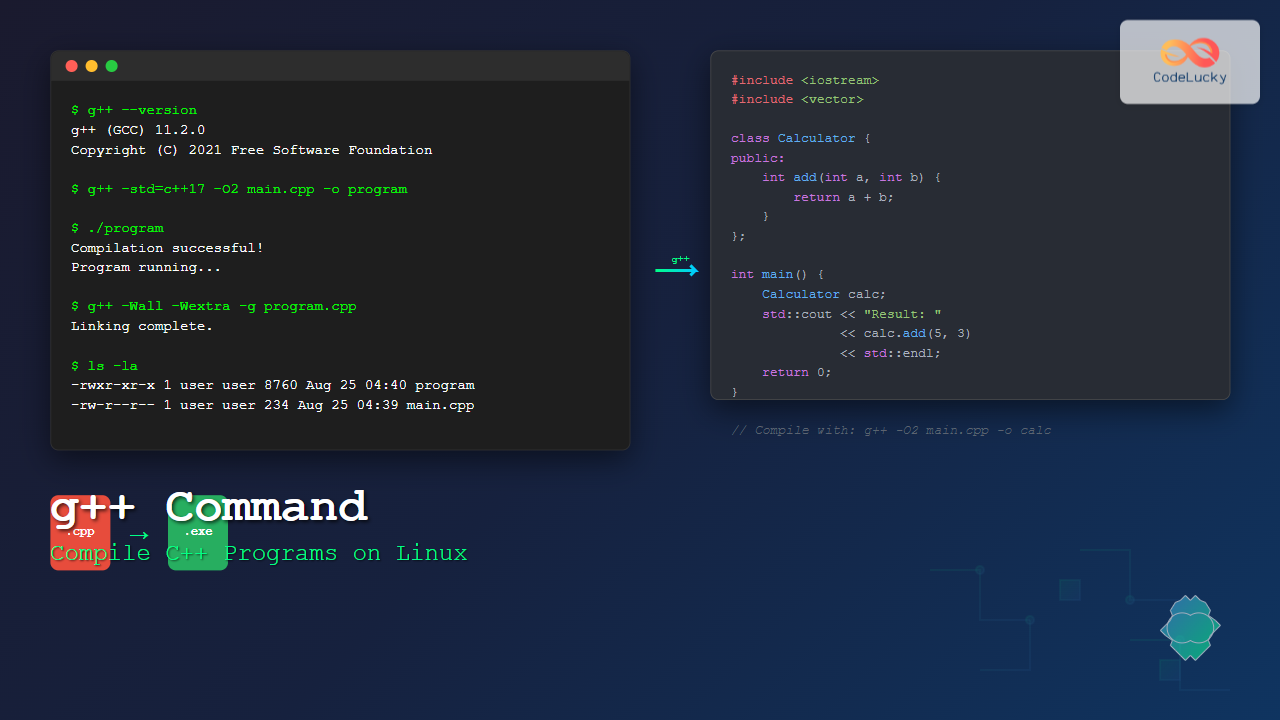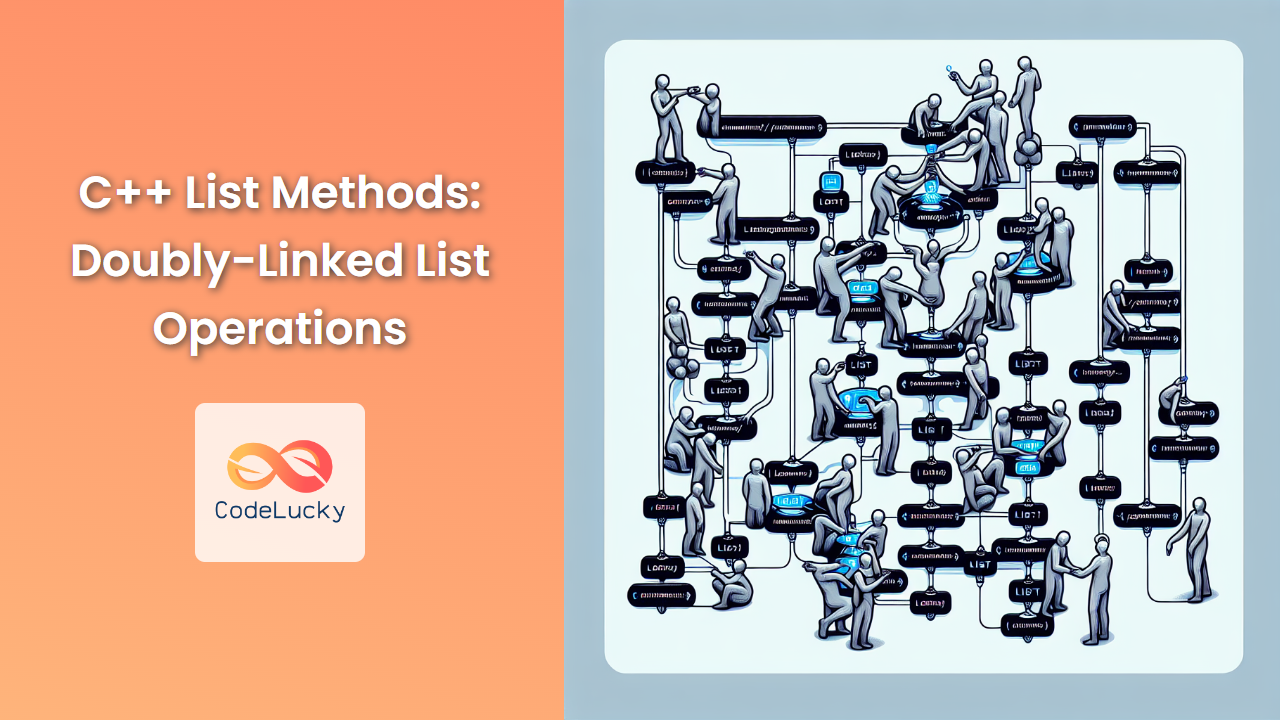Enumerations are a powerful feature in C++ that allow developers to create named constants, improving code readability and maintainability. In this comprehensive guide, we'll explore two types of enumerations in C++: the traditional enum and the more modern enum class. We'll dive deep into their syntax, usage, and best practices, providing you with the knowledge to leverage enumerations effectively in your C++ projects.
Traditional Enumerations (enum)
Traditional enumerations, declared using the enum keyword, have been a part of C++ since its inception. They provide a way to define a set of named constants, making code more expressive and easier to understand.
Syntax and Basic Usage
The basic syntax for declaring an enum is as follows:
enum EnumName {
Value1,
Value2,
Value3,
// ...
};
Let's look at a practical example:
#include <iostream>
enum Color {
RED,
GREEN,
BLUE
};
int main() {
Color myColor = GREEN;
if (myColor == GREEN) {
std::cout << "The color is green!" << std::endl;
}
return 0;
}
In this example, we've defined an enumeration Color with three values: RED, GREEN, and BLUE. By default, these values are assigned integers starting from 0, so RED is 0, GREEN is 1, and BLUE is 2.
🔍 Fact: Enumerations make code more readable by replacing magic numbers with meaningful names.
Assigning Custom Values
You can also assign custom integer values to enum members:
enum HttpStatus {
OK = 200,
NOT_FOUND = 404,
SERVER_ERROR = 500
};
int main() {
HttpStatus status = HttpStatus::NOT_FOUND;
std::cout << "Status code: " << status << std::endl;
return 0;
}
Output:
Status code: 404
In this case, we've assigned specific integer values to our enum members, corresponding to common HTTP status codes.
Limitations of Traditional Enums
While traditional enums are useful, they have some limitations:
- Scope pollution: Enum values are visible in the enclosing scope, which can lead to naming conflicts.
- Type safety: Enums can be implicitly converted to integers, which can lead to unexpected behavior.
- Forward declaration: Traditional enums cannot be forward-declared, which can complicate header files.
To address these issues, C++11 introduced a new feature: enum classes.
Enum Classes (C++11 and later)
Enum classes, also known as scoped enumerations, provide better type safety and scoping compared to traditional enums.
Syntax and Basic Usage
The syntax for enum classes is similar to traditional enums, but with the addition of the class keyword:
enum class EnumName {
Value1,
Value2,
Value3,
// ...
};
Let's revisit our color example using an enum class:
#include <iostream>
enum class Color {
RED,
GREEN,
BLUE
};
int main() {
Color myColor = Color::GREEN;
if (myColor == Color::GREEN) {
std::cout << "The color is green!" << std::endl;
}
return 0;
}
Notice that we now need to use the scope resolution operator (::) to access enum values. This prevents naming conflicts with other identifiers in the same scope.
Type Safety
Enum classes provide stronger type safety compared to traditional enums. They're not implicitly convertible to integers:
enum class Day {
MONDAY,
TUESDAY,
WEDNESDAY,
THURSDAY,
FRIDAY,
SATURDAY,
SUNDAY
};
int main() {
Day today = Day::WEDNESDAY;
// This won't compile:
// int dayNumber = today;
// Instead, you need to cast explicitly:
int dayNumber = static_cast<int>(today);
std::cout << "Day number: " << dayNumber << std::endl;
return 0;
}
Output:
Day number: 2
🔍 Fact: Enum classes prevent accidental comparisons between different enumeration types, enhancing type safety in your code.
Specifying the Underlying Type
By default, the underlying type of an enum class is int. However, you can specify a different underlying type if needed:
#include <iostream>
#include <cstdint>
enum class SmallEnum : uint8_t {
A, B, C
};
int main() {
SmallEnum e = SmallEnum::B;
std::cout << "Size of SmallEnum: " << sizeof(e) << " bytes" << std::endl;
return 0;
}
Output:
Size of SmallEnum: 1 bytes
In this example, we've specified uint8_t as the underlying type, which reduces the memory footprint of our enum.
Practical Examples and Use Cases
Let's explore some practical examples to demonstrate the power of enumerations in real-world scenarios.
Example 1: State Machine
Enumerations are excellent for representing states in a state machine. Let's create a simple traffic light controller:
#include <iostream>
#include <thread>
#include <chrono>
enum class TrafficLightState {
RED,
YELLOW,
GREEN
};
class TrafficLight {
private:
TrafficLightState state;
public:
TrafficLight() : state(TrafficLightState::RED) {}
void changeState() {
switch (state) {
case TrafficLightState::RED:
state = TrafficLightState::GREEN;
break;
case TrafficLightState::YELLOW:
state = TrafficLightState::RED;
break;
case TrafficLightState::GREEN:
state = TrafficLightState::YELLOW;
break;
}
}
void displayState() const {
switch (state) {
case TrafficLightState::RED:
std::cout << "Red Light - Stop!" << std::endl;
break;
case TrafficLightState::YELLOW:
std::cout << "Yellow Light - Prepare to stop" << std::endl;
break;
case TrafficLightState::GREEN:
std::cout << "Green Light - Go!" << std::endl;
break;
}
}
};
int main() {
TrafficLight light;
for (int i = 0; i < 6; ++i) {
light.displayState();
std::this_thread::sleep_for(std::chrono::seconds(2));
light.changeState();
}
return 0;
}
Output:
Red Light - Stop!
Green Light - Go!
Yellow Light - Prepare to stop
Red Light - Stop!
Green Light - Go!
Yellow Light - Prepare to stop
In this example, we use an enum class to represent the states of a traffic light. The TrafficLight class manages the state transitions and displays the current state.
Example 2: Configuration Options
Enumerations can be used to represent configuration options in a type-safe manner. Let's create a simple logging system:
#include <iostream>
#include <string>
enum class LogLevel {
DEBUG,
INFO,
WARNING,
ERROR,
CRITICAL
};
class Logger {
private:
LogLevel level;
public:
Logger(LogLevel l) : level(l) {}
void setLevel(LogLevel l) {
level = l;
}
void log(LogLevel messageLevel, const std::string& message) {
if (messageLevel >= level) {
std::cout << "[" << getLevelString(messageLevel) << "] " << message << std::endl;
}
}
private:
std::string getLevelString(LogLevel l) const {
switch (l) {
case LogLevel::DEBUG: return "DEBUG";
case LogLevel::INFO: return "INFO";
case LogLevel::WARNING: return "WARNING";
case LogLevel::ERROR: return "ERROR";
case LogLevel::CRITICAL: return "CRITICAL";
default: return "UNKNOWN";
}
}
};
int main() {
Logger logger(LogLevel::WARNING);
logger.log(LogLevel::DEBUG, "This is a debug message");
logger.log(LogLevel::INFO, "This is an info message");
logger.log(LogLevel::WARNING, "This is a warning message");
logger.log(LogLevel::ERROR, "This is an error message");
logger.log(LogLevel::CRITICAL, "This is a critical message");
std::cout << "\nChanging log level to INFO\n" << std::endl;
logger.setLevel(LogLevel::INFO);
logger.log(LogLevel::DEBUG, "This is a debug message");
logger.log(LogLevel::INFO, "This is an info message");
logger.log(LogLevel::WARNING, "This is a warning message");
logger.log(LogLevel::ERROR, "This is an error message");
logger.log(LogLevel::CRITICAL, "This is a critical message");
return 0;
}
Output:
[WARNING] This is a warning message
[ERROR] This is an error message
[CRITICAL] This is a critical message
Changing log level to INFO
[INFO] This is an info message
[WARNING] This is a warning message
[ERROR] This is an error message
[CRITICAL] This is a critical message
In this example, we use an enum class to represent different log levels. The Logger class uses this enum to determine which messages should be displayed based on the current log level.
Best Practices and Tips
When working with enumerations in C++, consider the following best practices:
-
Use enum classes for better type safety: Enum classes provide stronger type checking and avoid naming conflicts.
-
Provide meaningful names: Choose clear and descriptive names for your enumerations and their values.
-
Consider the underlying type: Use an appropriate underlying type for your enum class to save memory if needed.
-
Use enums for related constants: Group related constants together in an enumeration for better organization.
-
Avoid assigning explicit values unless necessary: Let the compiler assign values automatically unless you have a specific reason to assign them manually.
-
Use switch statements with enums: When working with enums in switch statements, consider adding a default case to handle unexpected values.
-
Consider using enum classes for bit flags: Enum classes can be used effectively for bit flags with the help of operator overloading.
🔍 Fact: The C++20 standard introduced the using enum declaration, which allows you to bring all enumerators from an enumeration into the current scope, reducing the need for qualification in some cases.
Conclusion
Enumerations in C++ provide a powerful way to create named constants, improving code readability and maintainability. Traditional enums offer simplicity and backwards compatibility, while enum classes introduced in C++11 provide enhanced type safety and scoping.
By understanding the strengths and limitations of both types of enumerations, you can choose the right tool for your specific needs. Whether you're creating a state machine, defining configuration options, or simply grouping related constants, enumerations can help make your C++ code more expressive and robust.
Remember to follow best practices when working with enumerations, and don't hesitate to leverage the type safety and scoping benefits of enum classes in your modern C++ projects. Happy coding!

